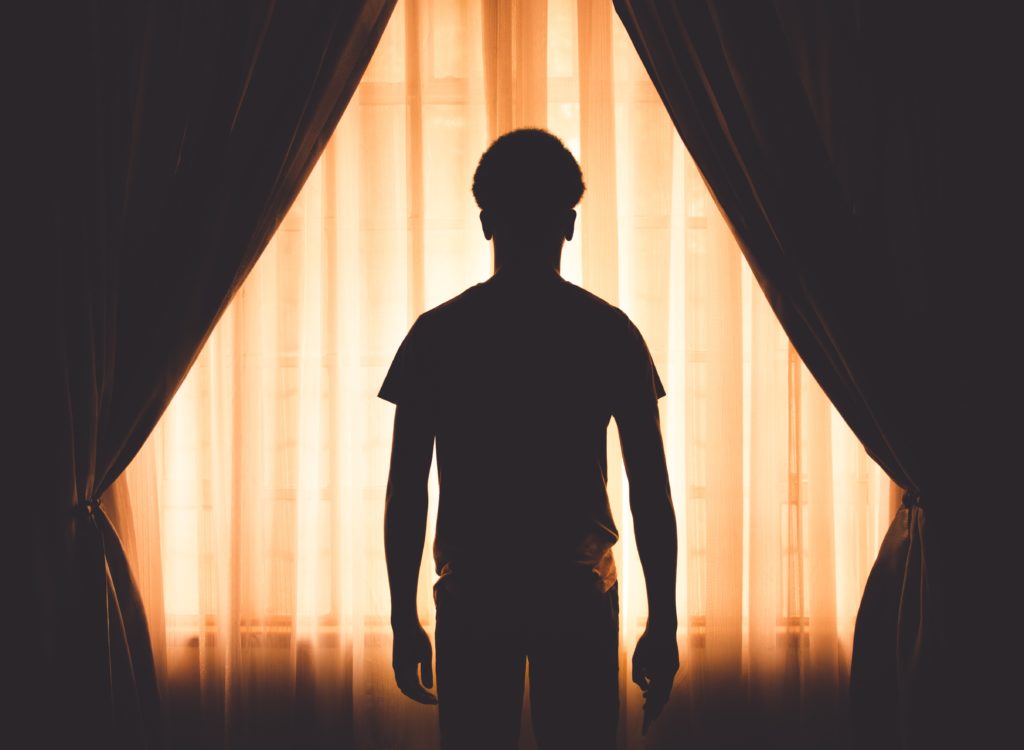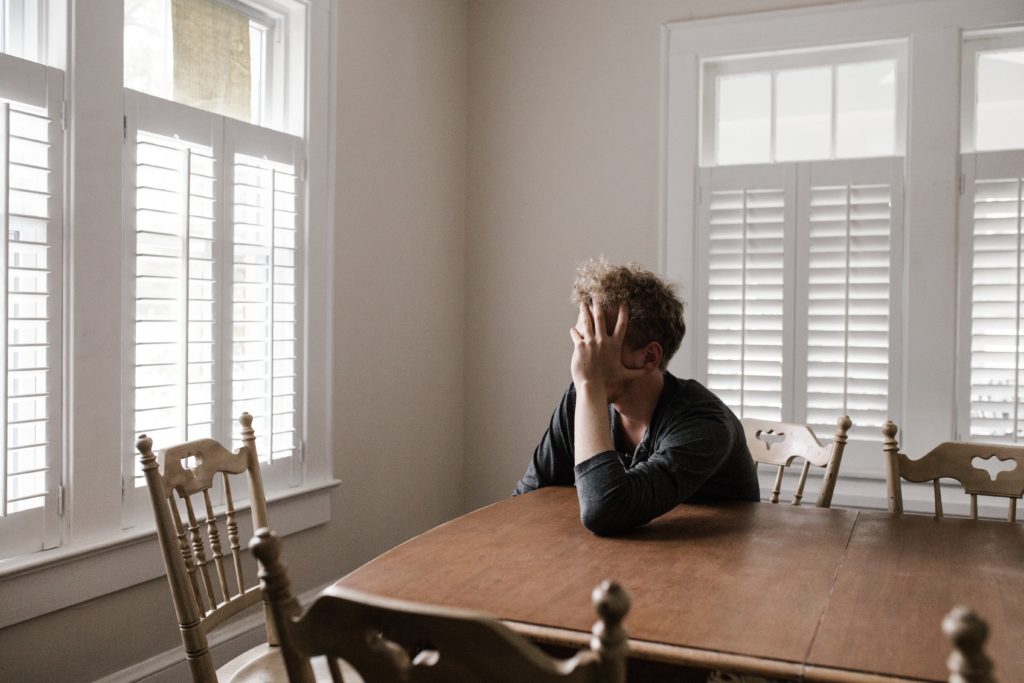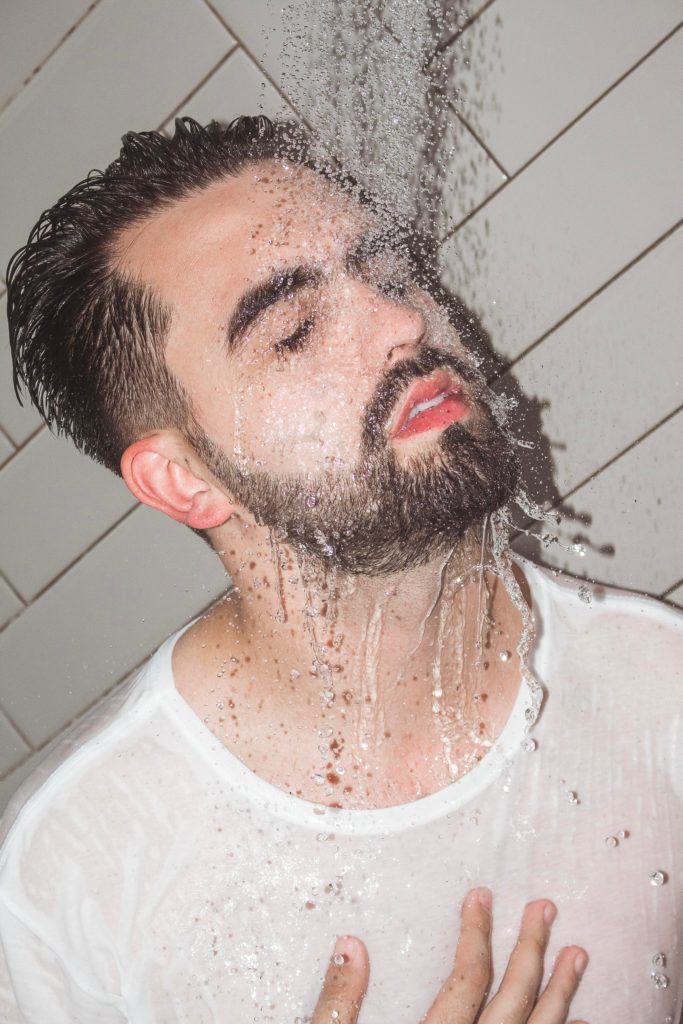Russell paced back and forth by the window.

The gray, rainy morning had finally broken and sunshine peeked through the clouds as they parted. Patches of clear blue were spreading across the sky. It seemed to Russell this change in the weather should brighten his thoughts, but they didn’t. He guessed it would take something much more powerful than a weather change to alter his outlook. He thought about how dark he felt…and wondered if there was suicidal risk triggered by stressors that affected people right now.
Russell was losing his belief in living. This wasn’t the first time he’d felt such futility in the daily endurance exercise that characterized his life. He’d felt hopeless before — but with time, a new job, and better pay, he’d lightened up and everything began to make sense again.
Then, he met someone and felt like he was basically sitting on top of the world. He hoped he could keep his life working so well. The idea that joy would become commonplace for him… that would be so great.
The job was such a good fit. And he seemed to learn it quickly. His skills improved every week and every month… then he was promoted. His boss would pat him on the back…tell him to keep up the good work and all that.
He believed he had a real future in this job…and a career in the making.

Jenna came along, and maybe it’s because he was feeling so much better, or maybe it was because she was so amazing…but it was easy to talk to her, and so rewarding to listen. It wasn’t long until they were spending lots of time together.
Then, the coronavirus crisis took over the world. There was no place to escape to…it had covered the entire globe! Nowhere was safe.
Settling Into a New Normal in a Global Crisis
He was assigned to work from home. That was ok. Not great. It wasn’t easy to do as well, or be as creative, under these circumstances. But he was grateful for the paycheck. Surely this was a temporary setback.
Next thing he knew, however, the governor ordered a lockdown. HIs company laid off thousands of people. And he was included in the second round of cutbacks.
So, now he’s home, he has no job, and no way to get one. Russell made a point to watch the statistics around the world to see if the tide was turning yet. He was lonely, and he missed Jenna. Even though it helped to talk on the phone or online. There were plenty of apps to connect with her. But it wasn’t the same.
The Crisis Hits Close to Home: Fighting Panic
One day, she sent him a text. “Russell, my sister Beth tested positive for the coronavirus today. She’s self-quarantined in her apartment. I’m so worried. And my mom is beside herself.”
Russell tried to be understanding…this was terrifying. He wondered when Jenna last saw her sister. When her mother had last seen Beth. He wondered if either of them had been exposed.
This made it all seem so much more real. More threatening, to himself and everyone he cared about.
He felt horrifically helpless. So he paced. He washed his hands for good measure. Then paced more.

Darn! It’s so hard to feel useless like this!! He checked on Jenna often, and always remembered to ask about Beth’s condition.
Finally, it turned out that Beth was being transported to the hospital. She was struggling to breathe at all.
Russell felt his throat closing. He fought panic.
Jenna was devastated about her sister’s decline. She said their mom was in a heap. Neither Jenna nor her mom could be at the hospital with Beth.
Weeks were going by.
How could you stand with someone if you couldn’t be near them? How do you do it all verbally? He feared his relationship with Jenna was disintegrating like his job had. But he knew her primary concern was her sister, and he was sure worried about her, too.
Russell had never been the best communicator. In times of difficulty it was hard to find the words. He’d always made up for it with effort. Showing his support with hugs, helping out with food, etc.
He had no idea how to do that from miles away.
He feared his relationship with Jenna was disintegrating like his job had. But he knew her primary concern was her sister, and he was sure worried about her too.
And felt so helpless.
When he wasn’t talking or texting with Jenna, he was applying for jobs online. It seemed he had surely applied for hundreds of them by now. But nothing. No responses to his applications. He could only imagine the number of applicants competing for each job. He was sure it was more than ever before in his life.
Still he kept applying.
It was good to stay busy, and at the same time, it felt so futile.
Weeks turned into months, and he finally applied for unemployment. Sickening.
How could everything be so good, then take a 90-degree turn straight into the toilet??
As if it all wasn’t enough, he heard from Jenna about her sister. Beth, who’d been in the ICU on a ventilator, finally died. They had thought she was improving…thought she would come off the ventilator soon… then suddenly, she deteriorated. And died.
Russell was stunned. Speechless.
Jenna was heartbroken. Blind with grief. He tried so hard to comfort her. To listen. But there was nothing he could say to relieve her pain.
He couldn’t go to her, hold her, take her out to dinner so she could vent. And her mom was grief stricken and seemed to expect Jenna to comfort her.
He couldn’t think. It was as if the entire world was self-destructing around him. His head was spinning.

Profound Grief Causes Its Own Isolation
Jenna seemed to just be gutted…depleted…with no more to give to anyone.
She withdrew after that. She and her mom could not have a funeral for Beth. As the days went on, they both seemed more and more traumatized by the circumstances surrounding Beth’s death.
Russell became less and less vital to their grief, it seemed. If they needed his support, he didn’t know how to give it. He felt so useless. So powerless. Utterly flabbergasted that life had collapsed as it had in a couple short months.
The grief he felt for Jenna’s loss eroded his foundations. His resilience. The energy seemed to drain out of him. His hope disappeared.
He’d been in his house for 2 months, and the strain, disappointment, disillusionment, loss, confusion, and anxiety of his circumstances became worse and worse until they were unbearable.
He saw no reason to go on. He looked at the future through his dark perspective, and it looked hopeless.
Even after the lockdown was lifted, he still wouldn’t have a job, right along with millions of other people. He would be evicted from his apartment, and lose his car.
The melancholy of the past swelled until he was drowning in it. Russell just didn’t have the energy to go on. He didn’t believe he was strong enough to face any more…
He wanted to die. Every hope… every purpose… for living was gone. He couldn’t see how he could go on…

Russell’s Not Alone: So Many Fight Despair in Times Like This
The crisis created by this COVID-19 coronavirus is creating stressors and fears that go far beyond the risk of the viral illness. And as our friend Russell identified, there is no where to escape to.
Hundreds of thousands of people feel the same feelings and are thinking the same thoughts. But in each case, the situation is not necessarily as it seems.
Unfortunately, it is what seems to be true that people all too often act upon. And suicidal risk triggered by stressors in this crisis rises higher and higher.
However — and this is important — thinking about suicide is not logical thinking, even though it may seem to be at the time. Suicidal thoughts are symptoms of a disordered mind.
Suicidal Risk Triggered by Stressors in This COVID-19 Crisis
The stress of isolation, financial difficulties and strain, the uncertainties about income in the future, the emotional pressure of being separated from those you care about and who care about you, combined with a host of feelings that come out of nowhere in a time like this… can push you to the point of desperation.
And…if you’ve struggled with psychiatric symptoms in the past, these elements can put you at higher risk.
But There Are Ways to Find Relief
However, as overwhelming as circumstances appear, they’re still temporary. They will change. Life will be restored. But that can be hard to grasp if the thoughts are swirling and swirling around inside your head.
Meanwhile, you can seek support from friends and family online, see their faces and vent, laugh, and cry together.
You can reach out for counseling through telemedicine. And then consider treatment.
Again, suicidal thinking is a symptom of a disordered mind.
If you find yourself thinking those thoughts, reach out for help. The circumstances of your life are not normal right now. And people everywhere are feeling similar feelings, as well as desperation, cooped up in their homes.
Suicidal Risk Triggered by Stressors Like Grief, Financial Uncertainty, and Fears of All Kinds… Can Be Lowered With Treatment
At Innovative Psychiatry, we’re treating people every week with ketamine treatment provided with carefully planned safety protocols.
Ketamine treatment is one of the most effective treatments for severe depression, bipolar depression, PTSD, social anxiety, and suicidal thoughts we know of. It also can relieve substance abuse and alcohol abuse.
As it goes to work restoring the synapses in your brain, proliferating connections between nerve cells to explode communication through your brain, it also can restore your motivation, your creativity, and your joy.
As a result, resilience replaces listlessness, energy replaces lethargy, and hope replaces despair.
In spite of how it all seems to you right now, that reality you’re experiencing is based on temporary circumstances… In the challenges ahead, how much better to have the energy and hope you need to conquer and create a reality that fulfills you?

There is a future. And you’re in it.
You can reduce the suicidal risk triggered by stressors in your life by reaching out for ketamine treatment. If you’re experiencing some of the things Russell is, call us.
Give yourself, and those who love you, the benefit of treatment that can give you a new lease on life. You can be amazed at how the direction of your thinking transforms.
There is life beyond this COVID-19 crisis. And you’re in it …with a bright future.

To the resilience of your best self,
